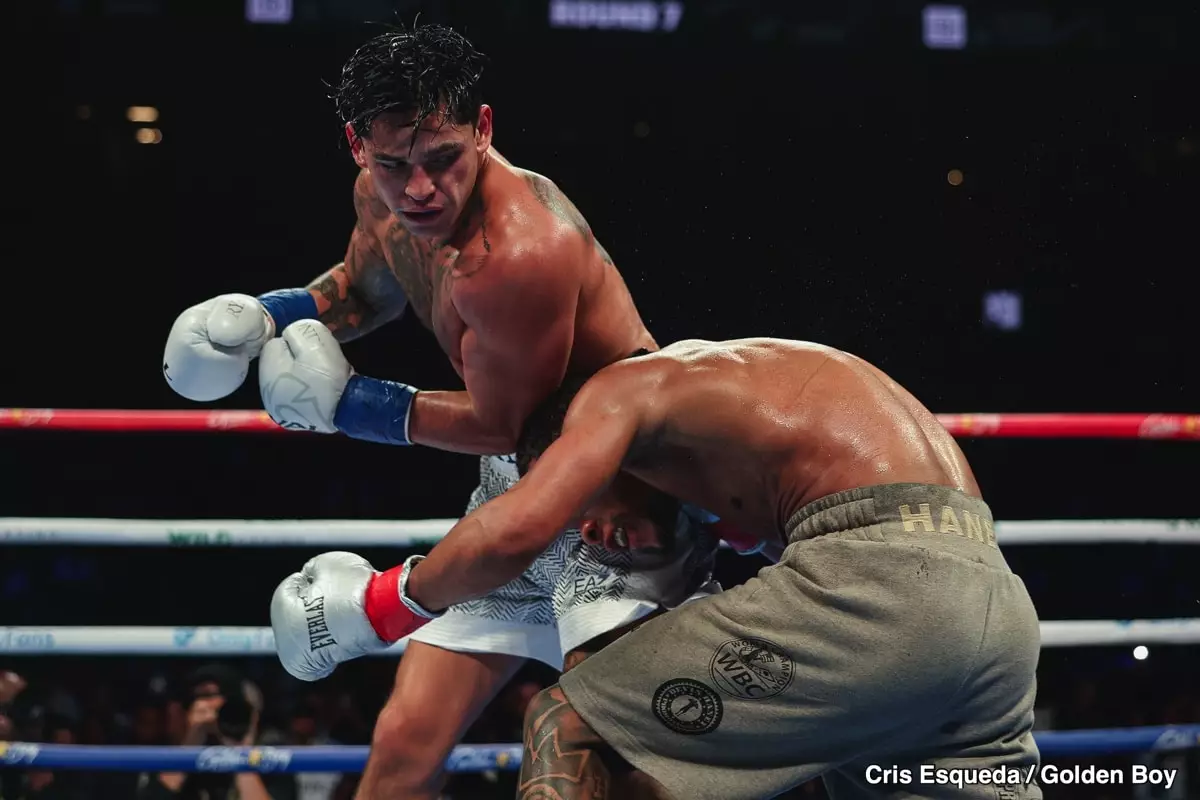The recent actions of boxer Devin Haney have drawn considerable scrutiny from fans and analysts alike, particularly after his decision to sue fellow fighter Ryan Garcia for battery, fraud, and unjust enrichment following their bout on April 20th. The fallout from this legal action has led to a tainted image for Haney, who finds himself defending not just his choices but also his reputation in a sport that thrives on public perception. Chris Algieri, a former professional boxer and current analyst, has expressed his views on the matter, highlighting the potential long-term damage to Haney’s career and public persona.
Haney’s choice to pursue legal recourse after losing to Garcia, particularly amid additional controversy regarding a positive test for performance-enhancing drugs (PEDs), has sparked widespread criticism. This reaction underscores a harsh reality in professional sports: a competitor’s image can suffer irreparable harm from a combination of poor performance and questionable off-the-ring decisions. Algieri argues that until Haney can redeem himself with impressive victories, he is likely to remain a target for ridicule on social media platforms.
The timing of the lawsuit is also a significant factor; many believe that Haney should have waited until he could boast a couple of noteworthy wins against high-caliber opponents before taking such drastic measures against Garcia. Instead, he appears to be trapped in a cycle of negativity, questioning the validity of his readiness to excel at welterweight, where he must contend with fighters of similar size. There’s a palpable sense of doubt surrounding Haney’s capacity to compete effectively against notable contenders in this weight class.
Analyzing the welterweight scene reveals that Haney may face significant challenges in establishing himself at this level. Names like Jaron Ennis and Brian Norman Jr. loom large in this division, both being formidable adversaries that could further complicate Haney’s journey back to championship contention. Ennis, in particular, is seen by many as particularly dangerous, and even in hypothetical bouts, Haney’s chances against such skilled opponents appear grim.
Garcia himself has stated emphatically that Haney would not be a match for him even in repeated encounters, further compounding the public perception of Haney’s capabilities. The nature of their fight, with Haney struggling to withstand Garcia’s left hook, serves as a stark reminder of the challenges that lie ahead for him. For Haney, this amounts to a critical juncture; he must reassess his strategy and possibly rethink his approach to training and preparation to reclaim his standing in boxing.
The backlash against Haney’s legal maneuvers has been swift and severe. Many fans have taken to social media to dissect his actions, leading to a narrative that paints him as someone who is unable to gracefully accept defeat. Algieri points out that this perception is detrimental to Haney, affecting not just his image but also his earning potential moving forward. The dramatic decline in interest, evidenced by low purse bids for his upcoming fights, suggests that promoters and fans are signaling disapproval.
The lack of enthusiasm surrounding Haney’s next fight, especially in the recent purse bid for a bout against Sandor Martin, highlights the decreasing confidence that fans and promoters might have in him. Once a rising star, Haney now appears to be in a quagmire—caught in headlines that favor his adversaries and overshadow his past accomplishments. If Haney is to climb out of his current predicament, he must find a way to channel this criticism into a comeback that silences doubters.
To revitalize his standing, Haney needs to return to the ring and demonstrate that he is a fighter of merit, one who can win against established opponents. Currently, he has missed chances to rebuild his brand and fan support. The decision to hold off on competing after a non-suspension is puzzling; engaging in bouts—even those that would come with a financial sacrifice—could potentially shift perceptions in a more favorable direction.
Moreover, the boxing community awaits the establishment of any unified commission capable of providing better oversight and regulations. With discussions surrounding issues like PED use and weight rehydration practices, the sport is heading toward a critical point where improvements could profoundly impact fighters’ careers and the integrity of the sport itself.
The intersection of legal issues and performance challenges has left Devin Haney at a crossroads—a position where he must navigate not just the path of physical readiness but also the intricacies of public perception and acceptance in the world of boxing. Without proper action, he may find it increasingly difficult to regain the momentum he has lost.

